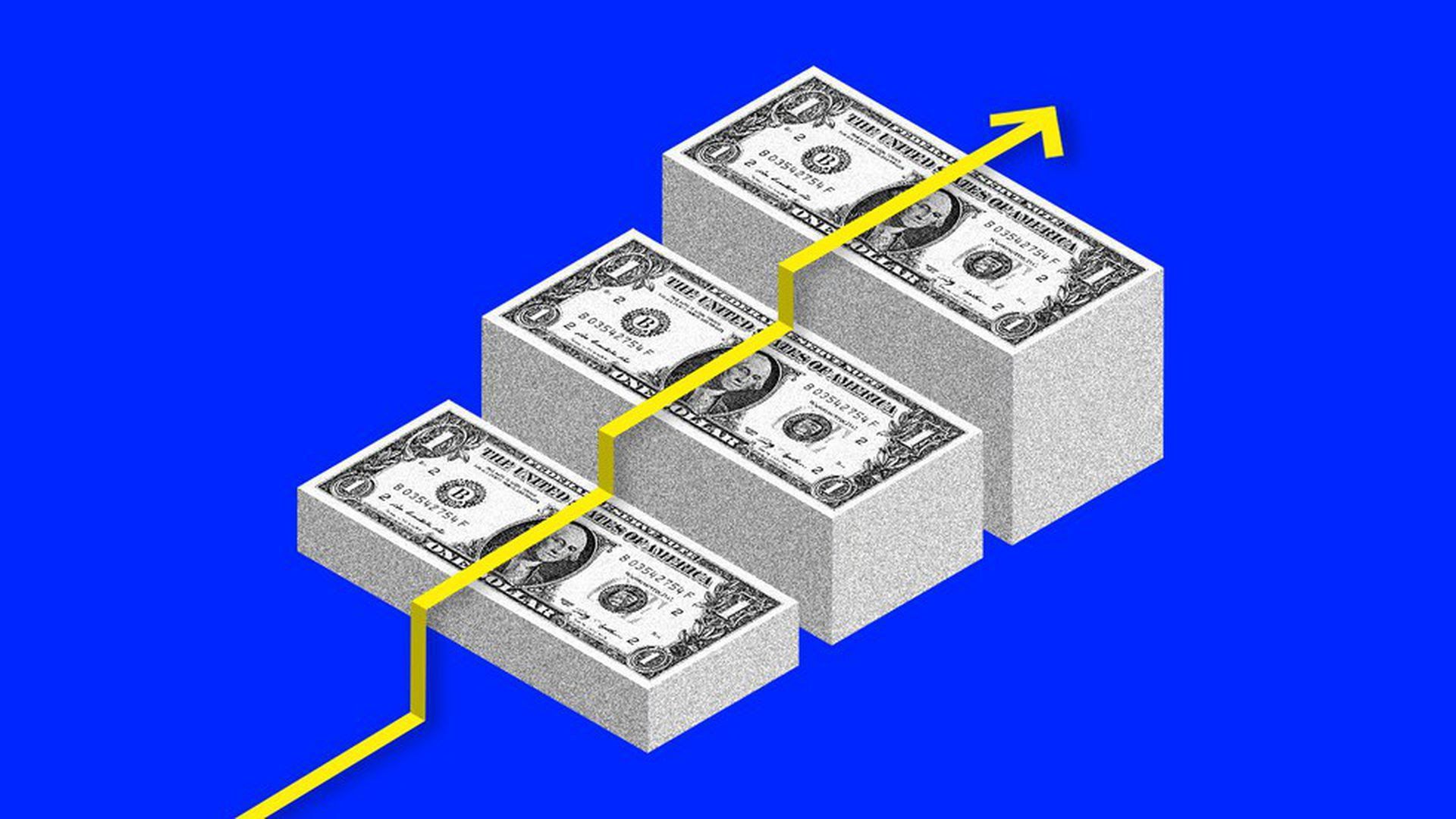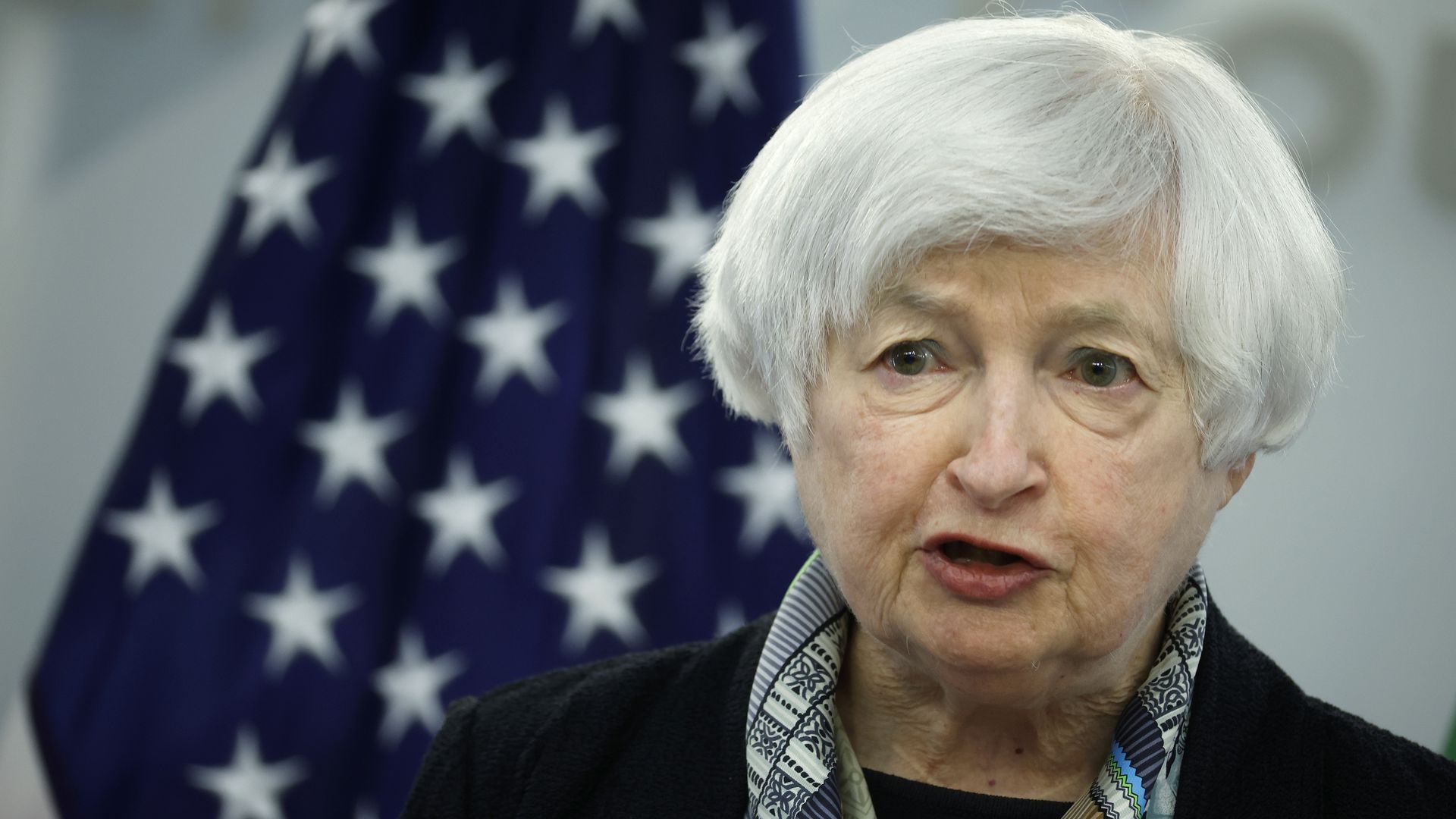| | | | | | | Presented By Ripple | | | | Axios Markets | | By Emily Peck and Matt Phillips · Apr 21, 2022 | | 🧇 Happy Thursday to the Markets faithful. It's Matt. - Today we're joined by Javier — he's our new boss, so be cool everybody — a seasoned observer of foreign exchange markets who's going to explain why the dollar has been getting so strong and why we should care.
I, then, drop some science on real interest rates. And Emily imparts valuable pearls of wisdom readers so kindly shared on returning to the office. Read on, it involves waffles. Today's newsletter, edited by Kate Marino, is 1,159 words, 4.5 minutes. | | | | | | 💸 1 big thing: The dollar's "relentless march" |  | | | Illustration: Rebecca Zisser/Axios | | | | Soaring U.S. interest rates have propelled the greenback to its strongest in nearly two years, Axios' Javier E. David writes. Why it matters: The resurgent dollar helps contain inflation, making imported goods cheaper. But it could become a headache for multinationals, as it crimps earnings when companies convert revenues earned abroad into dollars. The big picture: The recent sell-off in U.S. government bonds drove up rates, making U.S. assets more attractive and boosting global demand for the dollar, the world's top reserve currency and a safe haven. State of play: The difference between U.S. government bond yields and those of Europe and Japan have sent the latter two currencies reeling. - The dollar has added 10% against the Japanese yen and 5% against the euro this year.
What they're saying: Marc Chandler at Bannockburn Global Forex notes that "amid a historic sell-off in bonds, foreign investors have bought a record amount of U.S. securities over the six months through February (average $126 billion a month)," according to official data. - "Yes, someone has been selling U.S. bonds, but it does not look like it was Japan or central banks. Foreign investors have been significant buyers of U.S. assets through February," Chandler noted.
The impact: Consumers are pretty indifferent to currency fluctuations because the effects are often behind the scenes. But sometimes, they spring into view in ways that hurt big U.S. companies. - Most notably, the yen is languishing near a 20-year low against the dollar, which tends to make the U.S. manufacturing sector nervous. Historically, U.S. carmakers have been sensitive to the dollar-yen exchange rate, amid fears that the U.S. market will get flooded with cheap imports.
What to watch: So far this earnings season, companies have been mum on the dollar — but it's still early days. And amid the dollar's "relentless march higher…perceived wisdom is that, at some point, that strength becomes a headwind to U.S. equity performance," according to Huw Roberts at Quant Insight. |     | | | | | | 2. Catch up quick | | 🔋Batteries are the new oil — and the U.S. is lagging behind Europe and China in the race to make them. (Axios) ⚠️ Russia ruled in potential default over ruble payment on debt. (Bloomberg) 🇺🇦 Ukraine needs $5 billion a month to stay afloat, says IMF head. (FT) |     | | | | | | 3. G20 walkout ushers in a new era |  | | | Treasury Secretary Janet Yellen last week. Photo: Chip Somodevilla/Getty Images | | | | Meetings of global finance ministers and central bankers tend to be polite affairs, verging upon horribly boring. But with a dramatic walkout yesterday, American, Canadian and some European officials showed that the schisms between Russia and Western allies are deep enough to change that, Axios' Neil Irwin writes. Why it matters: The dedication of Western powers to using all economic tools available to make Russia a pariah state has become ever more evident, now backed by a vivid gesture on the biggest stage of financial diplomacy. Driving the news: At a meeting in Washington of the finance ministers and central bankers of the Group of 20 major economic powers, Treasury Secretary Janet Yellen, Federal Reserve chair Jerome Powell, European Central Bank head Christine Lagarde, and top officials from Canada, Britain, and elsewhere stood up and walked out when it was the Russian finance minister's turn to speak. - "The world's democracies will not stand idly by in the face of continued Russian aggression and war crimes," Canadian finance minister Chrystia Freeland said on Twitter. "Today Canada and a number of our democratic partners walked out of the G20 plenary when Russia sought to intervene."
The U.S. Treasury had been vague in the run-up to the meetings as to Yellen's degree of participation in the G20. Between the lines: The Western powers are seeking to apply pressure on the technocrats who staff Russia's economic policy establishment, by making clear that their nation is being frozen out of the good graces of the world economic system more completely with each week that passes. - Stylistically, the cautious Yellen is not prone to dramatic gestures, adding to the weight of the moment.
- The goal: To keep adding to the economic pressure on Russian President Vladimir Putin in hopes it forces him to seek a de-escalation.
|     | | | | | | A message from Ripple | | Real sustainability, industrywide | | |  | | | | Ripple, a company providing crypto solutions for business, is dedicated to sustainability — for the crypto industry as a whole. A co-founder of the Crypto Climate Accord, Ripple is committed to helping drive a low-carbon future for crypto. Learn more about a U.S.-based crypto innovator. | | | | | | 4. Rate hikes are about to get real |  Data: FactSet; Chart: Axios Visuals One of the most important numbers in the financial world — the yield on the 10-year Treasury note — is about to cross a major milestone, Matt writes. - Real 10-year Treasury yields — that is, bond yields after adjusting for inflation — are poised to scramble back into positive territory for the first time since the pandemic hit.
Why it matters: This is the moment when the Fed's effort to slow the economy by hiking rates actually begins to pinch — in real life. State of play: The conventional measure of real yields — the yield on a special kind of Treasury note that's adjusted for inflation — has risen sharply, from roughly negative 1% in early March to negative 0.07% yesterday. How it works: When real rates on Treasuries are negative, savers — including investors and business leaders — who buy government bonds basically lose a bit of money on the deal. That makes saving unattractive, compared to spending. So people tend to spend and the economy tends to strengthen. - When real rates go positive, it means savers can actually make a bit of money via the interest on their savings. They have a reason to save more — and spend less — which can take some of the wind out of the economy's sails.
The bottom line: This isn't like an on/off switch for the economy — but once rates go positive, it does mean we can expect to see the Fed's rate hikes start influencing actual economic activity, at least a bit more. |     | | |  | | | | If you like this newsletter, your friends may, too! Refer your friends and get free Axios swag when they sign up. | | | | | | | | 5. 🗣 We talked about returning to the office |  | | | Illustration: Lindsey Bailey/Axios | | | | Yesterday was Waffle Wednesday at BackBay Communications, the Boston-based firm where Axios Markets reader Fred Baldassaro works, Emily writes. Why it matters: Delicious breakfast foods are just the tip of the perk-berg. Employers who want workers back at the office are trying to lure them in with all manner of stuff: daily cash prizes, slippers, cocktails, etc. Driving the news: Many of you wrote to us and shared thoughts about the return to work after I admitted to some anxiety ahead of a meeting our whole team attended this week. (It went OK!) Between the lines: Sorry, but not everyone wants to commute an hour for a waffle, a glass of wine or a bagel you could get at home. - More importantly, not everyone can come back. Take parents of small kids. "We're missing 2-4 days of school a month with runny noses or earaches," writes Caryn Moore Lund, another Markets reader.
- She writes that being back in the office means "childcare complications and expenses," pointing to a child-care shortage in the Washington, D.C., area. There's one nationwide, too.
And, of course, most Americans don't need to return to the office. They never left in-person work. - "I find it rather infantile that people are so stressed over returning to the office- many of us never left it," writes reader Ann Skoglund, of Asheville, N.C. "Come back we won't bite."
|     | | | | | | A message from Ripple | | Our commitment: carbon-neutral by 2030 | | |  | | | | Ripple, a company providing crypto solutions for business, is on track to be carbon net-zero by 2030. We're reducing emissions, increasing clean energy use, investing in high quality carbon removal projects and using a carbon-neutral blockchain. Learn more about a U.S.-based crypto innovator. | | |  | It's called Smart Brevity®. Over 200 orgs use it — in a tool called Axios HQ — to drive productivity with clearer workplace communications. | | | | | | Axios thanks our partners for supporting our newsletters. If you're interested in advertising, learn more here.
Sponsorship has no influence on editorial content. Axios, 3100 Clarendon Blvd, Suite 1300, Arlington VA 22201 | | | You received this email because you signed up for newsletters from Axios.
Change your preferences or unsubscribe here. | | | Was this email forwarded to you?
Sign up now to get Axios in your inbox. | | | | Follow Axios on social media:    | | | | | |











No comments:
Post a Comment